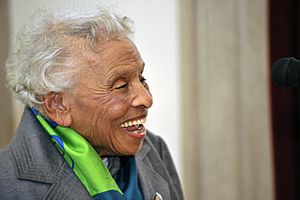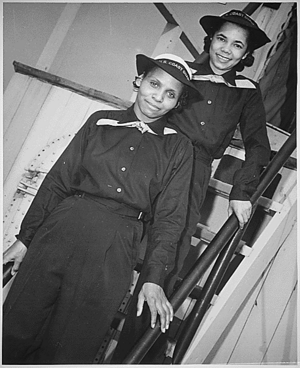Olivia Hooker facts for kids
Quick facts for kids
Olivia Hooker
|
|
|---|---|

Hooker in 2011
|
|
| Born |
Olivia Juliette Hooker
February 12, 1915 Muskogee, Oklahoma, U.S.
|
| Died | November 21, 2018 (aged 103) White Plains, New York, U.S.
|
| Education | Ohio State University (BA) Columbia University (MA) University of Rochester (PhD) |
| Military career | |
| Allegiance | United States |
| Service/ |
U.S. Coast Guard |
| Years of service | 1945–1946 |
| Rank | Yeoman Second Class |
| Unit | SPARS |
| Battles/wars | World War II |
| Awards | Coast Guard Good Conduct Medal |
Olivia Juliette Hooker (February 12, 1915 – November 21, 2018) was an amazing American psychologist and professor. She was one of the last people alive who remembered the terrible Tulsa race massacre of 1921. She also made history as the first African-American woman to join the United States Coast Guard in February 1945.
During World War II, she was part of the Coast Guard Women's Reserve, known as SPARS. She earned the rank of Yeoman, Second Class. After her military service, she became a psychologist and taught at Fordham University.
Contents
Olivia Hooker's Early Life and School
Olivia was born in Muskogee, Oklahoma. She was one of five children. Her family lived in the Greenwood District of Tulsa. This area was known as "Black Wall Street" because it had many successful Black-owned businesses.
On May 31, 1921, a group of white men attacked their home. They destroyed many of their belongings. Olivia and her siblings hid under a table. She was only six years old and had to stay very quiet. This attack was part of the Tulsa race massacre. During this event, parts of the Greenwood District were destroyed. Many people were killed, and thousands lost their homes.
In 1997, Olivia and other survivors started the Tulsa Race Riot Commission. They wanted to investigate the massacre and seek justice. In 2003, she was part of a lawsuit asking for payment for the damage. The lawsuit was against the state of Oklahoma and the city of Tulsa. However, the US Supreme Court did not hear the case in 2005.
After the massacre, her family moved to Topeka, Kansas, and then to Columbus, Ohio. Olivia earned her first degree in 1937 from The Ohio State University. She then taught third grade. While at OSU, she joined the Delta Sigma Theta sorority. She worked to help African-American women join the U.S. Navy.
In 1947, she earned her master's degree from the Teachers College of Columbia University. Later, in 1961, she earned her PhD in clinical psychology from the University of Rochester. Her PhD research was about how children with Down syndrome learn.
Career Highlights
Joining the U.S. Coast Guard

Olivia first tried to join the U.S. Navy's WAVES program. She was initially turned away because of her race. She challenged this decision and was accepted. However, she decided to join the Coast Guard instead.
She joined the U.S. Coast Guard in February 1945. On March 9, 1945, she went to basic training in Manhattan Beach, Brooklyn, New York. She became a Coast Guard Women's Reserve, known as a SPAR. She was one of only five African-American women to first join the SPARS program.
After basic training, Olivia became a yeoman. This meant she did administrative duties. She earned the rank of Yeoman Second Class. In June 1946, the SPAR program ended. Olivia earned the rank of petty officer 2nd class and a Good Conduct Award.
Work in Psychology
After getting her master's degree, Olivia worked at a women's correctional facility in Albion County. She felt that many women there were unfairly labeled as having learning disabilities. She re-evaluated them with an open mind. Her goal was to help these women get better education and jobs after leaving the facility. Today, the facility still helps women earn degrees and job experience.
In 1963, she started teaching at Fordham University. She was a senior clinical lecturer and a psychology professor. She became an associate professor and taught there until 1985.
Olivia also helped start a special division of the American Psychological Association (APA). This division focused on intellectual and developmental disabilities. The APA later honored her for her work with children. She was an early director at the Kennedy Child Study Center in New York City. There, she helped children with learning difficulties by giving evaluations and support.
Later Life and Legacy
Olivia Hooker retired at the age of 87. Even in her later years, she remained active. At 95, she joined the Coast Guard Auxiliary in Yonkers, New York.
She received many honors for her contributions. In 2011, she got the American Psychological Association Presidential Citation. In 2012, she was added to the New York State Senate Veterans' Hall of Fame.
On February 9, 2015, Senator Kirsten Gillibrand spoke in Congress to honor Olivia. That same year, a dining hall at the Staten Island Coast Guard facility was named after her. A training facility in Washington, D.C., was also named in her honor.
On May 20, 2015, President Barack Obama recognized Olivia's service. He spoke about her legacy at the Coast Guard Academy graduation.
On November 11, 2018, Google honored her with a special Google Doodle for Veterans Day. Olivia Hooker passed away peacefully at her home in White Plains, New York, on November 21, 2018. She was 103 years old.
The book Tulsa Girl, by Shameen Anthanio-Williams, tells Olivia's story. It focuses on her experiences during the Tulsa Race Riots.
In October 2019, it was announced that a new Coast Guard ship would be named after her. The fast response cutter USCGC Olivia Hooker is expected to join the Coast Guard fleet after 2023.
 | John T. Biggers |
 | Thomas Blackshear |
 | Mark Bradford |
 | Beverly Buchanan |

